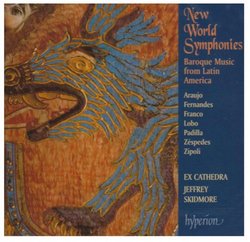| All Artists: Peruvian Anonymous, Juan Gutierrez de Padilla, Gaspar Fernandes, Juan de Araujo, Alonso Lobo, Hernando Franco, Domenico Zipoli, Juan [1] Garcia, Jeffrey Skidmore, Ex Cathedra Chamber Choir and Baroque Orchestra Title: New World Symphonies: Baroque Music from Latin America Members Wishing: 0 Total Copies: 0 Label: Hyperion UK Original Release Date: 1/1/2003 Re-Release Date: 6/10/2003 Album Type: Import Genres: Special Interest, Pop, Classical Styles: Vocal Pop, Opera & Classical Vocal, Historical Periods, Baroque (c.1600-1750), Sacred & Religious, Symphonies Number of Discs: 1 SwapaCD Credits: 1 UPC: 034571173801 |
Search - Peruvian Anonymous, Juan Gutierrez de Padilla, Gaspar Fernandes :: New World Symphonies: Baroque Music from Latin America
 | Peruvian Anonymous, Juan Gutierrez de Padilla, Gaspar Fernandes New World Symphonies: Baroque Music from Latin America Genres: Special Interest, Pop, Classical
|
Larger Image |
CD Details |
CD ReviewsMagical Music John L. Rodgers | NSW Australia | 12/17/2003 (5 out of 5 stars) "For those who enjoy early baroque music, (especially that of Spanish origin), this is magical stuff. The accompanying notes and translations are interesting and helpful. The performance by Skidmore & Ex Cathedra is professional and exciting. The melodies and rhythms are infectious. A previous review (which seems to have been removed) strongly criticized this CD because the reviewer claimed that this music glorifies the actions in the New World of the 16th century Spanish invaders and missionaries. If you hold rigid PC views about the impact of Christianity on indigenous cultures then maybe you might agree with that view. People with a knowledge of history recognize that much evil has been done in the name of the Christian God, but that is not the issue here. If you enjoy beauty, open your mind and ears and listen. You will hear music of great beauty and originality that will uplift you." Some Wonderful Music at the Crossroads John L. Rodgers | 10/23/2003 (5 out of 5 stars) "Here is superb compendium of works from the Latin American Baroque that shows how well composers of the New World melded the art music of Europe with native strains. Juan de Araujo, Gaspar Fernandes, Juan Zespedes, and the ubiquitous Anonymous supply the native elements, some of the music based on words and undoubtedly melodies of the native Indian people of Latin America, while Araujo and Zespedes look to the folk dances of Africa to commemorate the Nativity in a beguilingly earthy fashion.Interspersed with this folk-inspired music are the liturgical works of Juan de Padilla, Hernando Franco, and Domenico Zipoli, including all of Padilla's dignified "Missa Ego flos campi" and the lovely Kyrie and Gloria from Zipoli's "Missa San Ignacio." Franco's "Salve Regina" is a little classic of the late Renaissance, complete with mannerist harmonies in the fashion of Gesualdo or Monteverdi.Juan Zespedes' "Convidando esta la noche" comes last on the disc. Skidmore and his producers know what must be the musical highpoint of the CD no matter how sophisticated the efforts of the European-trained musicians, like Zipoli and Padilla, represented here. Short though it may be (only four minutes), "Convidando" is the perfect little Christmas cantata. It starts with a tender hymn to the new-born Jesus sounding very much like the Reformation folksong-turned-Christmas carol "Es ist ein Ros ensprungen." The hymn gives way repeatedly to celebration in the form of the guaracha, a dance of African origin apparently still popular in Cuban today. Accented with traditional Latin American rhythm instruments and high "yip-yips" from the chorus, it is a joy to the ear and to the heart, as it must have been to listeners when it was written over three hundred years ago.This wonderful disc garnered praise when it appeared in Europe and deserves a big audience on this side of the Atlantic. All praise to Jeffrey Skidmore, Ex Cathedra, and Hyperion." Exquisite, culturally broad, delightful to ears and soul Michael L. Rudzis | Edmonds, WA USA | 06/18/2005 (5 out of 5 stars) "This performance by Jeffrey Skidmore's Ex Cathedra is perhaps the very best of many purchases of liturgically related music that we have made. I write not as one who is musically trained, but just one who knows when he hears something that is absolutely excellent. One can discern in these pieces the development of Church music throughout the ages, the distinctive influence of the Baroque period, and the strong Latin American flavor derived from the Spanish and native cultures. It is simply uplifting, and we don't tire of listening to it again and again. I would not have known about this recording, or even Ex Cathedra, had I not heard the first track, "Hanaq pachap kusikuynin" on London's Classic FM station on the internet. I am surprised that this work is not yet more popular in here in the States. Certainly it deserves to be."
|

 Track Listings (15) - Disc #1
Track Listings (15) - Disc #1